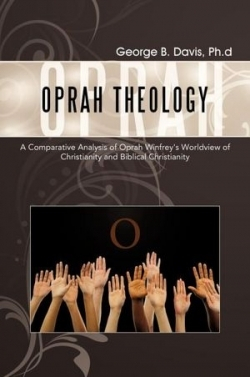Oprah Theology
A Comparative Analysis of Oprah Winfrey's Worldview of Christianity and Biblical Christianity
In Oprah Theology, author George B. Davis, Ph.D, takes Oprah Winfrey to task for her role in leading Christians to believe they can stray from a conservative interpretation of the Bible and still remain faithful to their religion.
The author traces the evolution of Winfrey’s religious beliefs, beginning with a Bible-based upbringing in a Southern Baptist church rural Mississippi to her more liberal beliefs grounded in the tenets of New Age spirituality. Making the case that Winfrey has strayed so far from her roots as to make her current beliefs incompatible with the traditional, unchanging dictates of Christianity, Davis argues that Winfrey has become a false prophet of the religion.
Winfrey is neither an ordained minister of any denomination nor a Doctor of Theology who stands before a congregation each Sunday. As Davis notes, Winfrey is a television personality, magazine publisher, best-selling author, actress, and elite guest speaker. It is Winfrey’s ascension to celebrity figure with the desire and the means to wield tremendous power in the realms of both social consciousness and personal belief, that makes her alleged heresies so pernicious, according to Davis. As Winfrey goes, warns Davis, so may go huge numbers of the Christian flock, most of whom, he fears, lack accurate understanding of their religion and consequently are not even aware of the error of their ways.
Davis claims that, at its most egregious, Winfrey’s theology replaces devotion to God with adoration of the self, and, rather than adhering to a coherent faith based in Christian tradition, hand picks beliefs from a veritable cafeteria menu of faith traditions. According to him, Winfrey herself might suggest she is promoting a more enlightened, empowering approach to a personal relationship with God, one where each individual personalizes faith based on a mosaic of smaller truths. It may feel good and it may seem harmless, says Davis, but the end result of following Winfrey’s patchwork religion is to remove oneself so far from God that finding one’s way back to Him may not be possible. At stake, the author argues, may be the integrity of Christianity itself and the salvation of countless individual souls.
Davis methodically dismantles Winfrey’s beliefs throughout the second half of his book. But the strength of his thesis is marred by an overly detailed recounting of Winfrey’s life, to which he devotes nearly the first half of the book. His writing is also frequently careless. On Page 124 alone, one can easily pick out at least five typographical or grammatical errors and there are enough faulty word choices throughout the remainder of the book to prove that it requires the services of a capable editor.
Davis has not written a perfect book. Still, there remains plenty here to interest readers willing to take a closer look at how Winfrey’s personal religious beliefs measure up against a more conservative approach to Christianity.
Reviewed by
Diane Taylor
Disclosure: This article is not an endorsement, but a review. The publisher of this book provided free copies of the book and paid a small fee to have their book reviewed by a professional reviewer. Foreword Reviews and Clarion Reviews make no guarantee that the publisher will receive a positive review. Foreword Magazine, Inc. is disclosing this in accordance with the Federal Trade Commission’s 16 CFR, Part 255.

